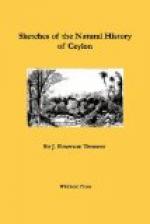CHAP. IV.
THE ELEPHANT.
* * * * *
Elephant Shooting.
As the shooting of an elephant, whatever endurance and adroitness the sport may display in other respects, requires the smallest possible skill as a marksman, the numbers which are annually slain in this way may be regarded as evidence of the multitudes abounding in those parts of Ceylon to which they resort. One officer, Major ROGERS, killed upwards of 1400; another, Captain GALLWEY, has the credit of slaying more than half that number; Major SKINNER, the Commissioner of Roads, almost as many; and less persevering aspirants follow at humbler distances.[1]
[Footnote 1: To persons like myself, who are not addicted to what is called “sport,” the statement of these wholesale slaughters is calculated to excite surprise and curiosity as to the nature of a passion that impels men to self-exposure and privation, in a pursuit which presents nothing but the monotonous recurrence of scenes of blood and suffering. Mr. BAKER, who has recently published, under the title of “The Rifle and the Hound in Ceylon” an account of his exploits in the forest, gives us the assurance that “all real sportsmen are tender-hearted men, who shun cruelty to an animal, and are easily moved by a tale of distress;” and that although man is naturally bloodthirsty, and a beast of prey by instinct, yet that the true sportsman is distinguished from the rest of the human race by his “love of nature, and of noble scenery.” In support of this pretension to a gentler nature than the rest of mankind, the author proceeds to attest his own abhorrence of cruelty by narrating the sufferings of an old hound, which, although “toothless,” he cheered on to assail a boar at bay, but the poor dog recoiled “covered with blood, cut nearly in half, with a wound fourteen inches in length, from the lower part of the belly, passing up the flank, completely severing the muscles of the hind leg, and extending up the spine; his hind leg having the appearance of being nearly off.” In this state, forgetful of the character he had so lately given of the true sportsman, as a lover of nature and a hater of cruelty, he encouraged “the poor old dog,” as he calls him, to resume the fight with the boar, which lasted for an hour, when he managed to call the dogs off; and perfectly exhausted, the mangled hound crawled out of the jungle with several additional wounds, including a severe gash in his throat. “He fell from exhaustion, and we made a litter with two poles and a horsecloth to carry him home.”—P. 314. If such were the habitual enjoyments of this class of sportsmen, their motiveless massacres would admit of no manly justification. In comparison with them one is disposed to regard almost with favour the exploits of a hunter like Major ROGERS, who is said to have applied the value of the ivory obtained from his encounters towards the purchase of his successive regimental commissions, and had, therefore, an object, however disproportionate, in his slaughter of 1400 elephants.




